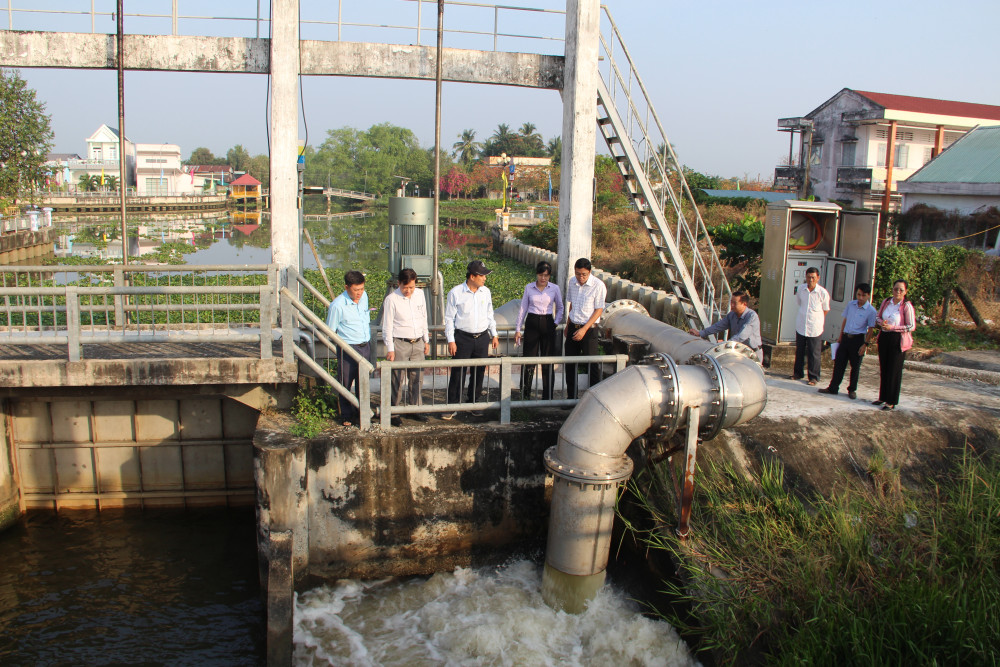
A working group of the Department of Agriculture and Environment inspects drought and salinity prevention and control in Thu Thua commune
Many challenges from climate change
Tay Ninh is a province with low terrain, dense river system and is strongly influenced by the East Sea through two large branches of the Vam Co Dong and Vam Co Tay rivers. With this natural feature, the province has great potential for land, water, forest and wetland ecology resources.
However, in recent years, the province has been facing many serious challenges related to resource degradation, environmental pollution and negative impacts of climate change.
According to the assessment of the professional sector, the situation of over-exploitation of resources, unreasonable land use, surface water pollution due to untreated domestic and industrial wastewater, and incomplete collection of solid waste, etc., is happening in many localities. The groundwater level is decreasing, and land subsidence is becoming more and more evident in riverside areas. Forest resources, especially Melaleuca forests and mangrove forests, are also being narrowed due to land use conversion and natural ecosystem degradation.
Meanwhile, climate change is becoming increasingly evident with specific manifestations such as saltwater intrusion, prolonged drought, unseasonal rains, high temperatures and the risk of rising sea levels. In the dry season, especially from February to May, saltwater penetrates deeply through the Vam Co Dong and Vam Co Tay rivers, seriously affecting production and people's lives.
At times, salinity measured in many intra-field canals of localities in the lower regions such as Can Giuoc, Can Duoc, Tan Tru, etc. exceeded 4g/l - the threshold that is harmful to rice and fruit trees. Notably, in many communes without groundwater or with saline surface water, people have to exchange fresh water for 50,000-100,000/m³ VND, in some places up to 200,000/m3 VND.
During the rainy season, flooding still occurs frequently, affecting rural traffic and agricultural crops, especially in low-lying areas such as Vinh Chau, Moc Hoa, Binh Hoa, Tuyen Thanh, etc.
In addition, rapidly developing industries and urban areas in localities such as Duc Hoa, Ben Luc, Can Giuoc, etc. also put great pressure on environmental treatment infrastructure. Wastewater treatment systems in many industrial clusters are not yet synchronized. Large amounts of household waste are generated while classification, recycling and treatment works are still limited.
Sand mining activities on rivers and illegal construction along canals and ditches also increase the risk of riverbank erosion - a phenomenon that has become increasingly common in the past 3-5 years.
In this situation, the province has identified protecting resources, improving the living environment and effectively adapting to climate change as urgent and strategic requirements. Many policies and plans have been issued, but to achieve real effectiveness, there needs to be changes in development thinking, specific actions and synchronous participation of the whole society.
Proactive adaptation to climate change
Early identifying these risks and challenges, the province has proactively developed and implemented many practical action plans to protect resources, the environment and adapt to climate change.
In particular, the Action Plan to Respond to Climate Change for the 2021-2030 period, with a vision to 2050, has clearly identified specific goals, comprehensive solutions and an implementation roadmap for each stage.
In terms of infrastructure, the province prioritizes investment in upgrading and expanding the system of dykes, salinity control sluices, canals and ditches in areas frequently affected by salinity intrusion such as Can Duoc, Can Giuoc and Tan Tru. Dozens of centralized clean water supply projects have been put into operation, contributing to ensuring domestic water sources for people in the lower regions.
Projects to dredge canals, ditches, upgrade rural roads combined with drainage are also being accelerated in many communes in the Dong Thap Muoi region to minimize damage caused by flooding during the rainy season.
In agricultural production, the province promotes the conversion of crop and livestock structures to suit new conditions, encouraging farmers to cultivate salt-tolerant rice varieties, short-term rice varieties or switch to growing vegetables during the dry and salty seasons.
Models of growing organic dragon fruit, melons in greenhouses, and vegetables following VietGAP standards, using water-saving irrigation systems are being widely replicated. In particular, the application of high technology in production, combined with biological measures in pest and disease control to help farmers reduce investment costs, improve production efficiency and minimize negative impacts on the environment are also being implemented.
According to the Department of Agriculture and Environment, in recent times, the department has implemented many activities such as monitoring the quality of surface water, groundwater, and air; building an environmental database system and integrating it into the land management platform; strengthening inspection and handling of violations in waste discharge and resource exploitation.
In addition, the department also focuses on inventorying greenhouse gases at production facilities, planning to reduce emissions and gradually transitioning to a circular economic development model and a green economy.
Some industrial parks in Duc Hoa and Can Giuoc have invested in centralized wastewater treatment systems and collected hazardous industrial waste. They have also installed rooftop solar power systems for factories to save electricity and reduce emissions.
Propaganda and raising public awareness about environmental protection and climate change response have also been promoted through training courses, seminars, and communication programs on mass media.
Many localities have established youth volunteer teams to clean up the environment, plant trees, collect plastic waste, and create a green living movement in the community.
In the coming time, the Department of Agriculture and Environment aims to improve the capacity to forecast and warn of natural disasters early, and develop detailed climate change response scenarios for each ecological region.
The department will also promote international cooperation, call for investment capital for climate change adaptation and emission reduction projects, focusing on areas such as renewable energy, wastewater treatment, forest protection and biodiversity.
In addition, the department will advise the Provincial People's Committee to develop mechanisms and policies to encourage businesses to invest in green production, use environmentally friendly technology, promote green growth models and sustainable development.
From practice and achieved results, it can be affirmed that the province is gradually realizing the goal of sustainable socio-economic development, in harmony with nature, and effectively adapting to climate change.
Although there are still many difficulties, with high political determination, consensus of the people and the participation of the entire political system, the province can completely become a bright spot in the region in protecting resources, the environment and adapting to climate change. This is not only an immediate responsibility but also a practical action to protect the future of future generations./.
By Bui Tung - Translated by Q. Thien
Source: https://baolongan.vn/bao-ve-tai-nguyen-moi-truong-thich-ung-voi-bien-doi-khi-hau-a198034.html
 Vietnam’s fertility plummets, workforce quality concerns mount: national survey
Vietnam’s fertility plummets, workforce quality concerns mount: national survey



